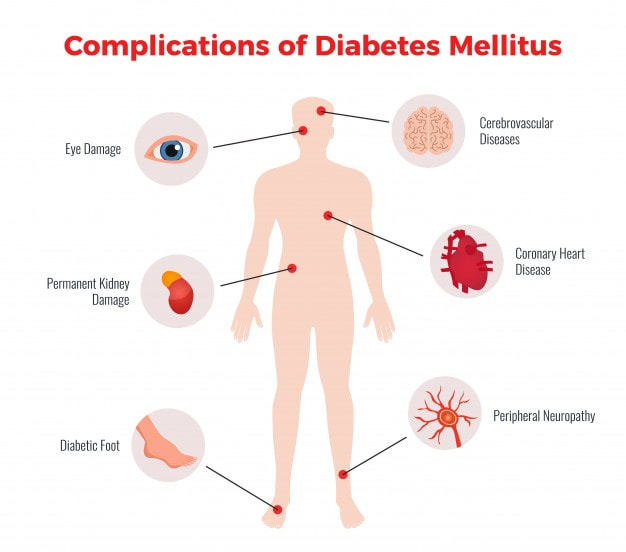|
Has your doctor suggested that you get testing for diabetes? Diabetes can affect your health from your head to your toes - truly! When uncontrolled, high blood sugar can negatively affect the health of your blood vessels, leading to tingling and numbness (called neuropathy), or more severe damage to organs such as your kidneys and heart. Getting screened for diabetes is done through blood work. Whenever you get bloodwork done at the doctor, it's important to follow the fasting recommendations so they can evaluate your fasting blood sugar levels. The doctor can also do a test call "hemoglobin A1C" and use non-fasting blood sugar cut-offs if you are not fasting, but will likely want you to follow-up with a second blood test when you are fasting. Read on to learn why your doctor may suggest you get tested for diabetes and why its important to do so. Your doctor may suggest you get screened for diabetes if you have a family history of the disease, if you are overweight/obese with a sedentary lifestyle, if you had gestational diabetes when you were pregnant or if you gave birth to a particularly large baby (9+ lbs), if your blood pressure is high (hypertension), if your lipids are high (hyperlipidemia or dyslipidemia), if you have polycystic ovarian syndrome (PCOS), or a history of heart disease. If you have symptoms of diabetes complications, such as poor wound healing or neuropathy, your doctor may also have you screened for diabetes. Learn more here. In addition to poor wound healing and neuropathy, here are 4 more complications of untreated diabetes. Hopefully they'll convince you to fast for your next doctor appointment! Note that following your treatment plan and keeping your sugar under control can prevent most if not all of these complications, even if you have diabetes. Nerve DamageHigh levels of sugar in your blood can case damage to your nerves, leading to peripheral neuropathy which feels like tingling, numbness, or pain in your feet and making it difficult for wounds to heal. You may not feel a cut or sore on your foot until it is infected. Nerves in other parts of your body can also be damaged, leading to bladder problems and erectile dysfunction. Eye ProblemsHigh levels of sugar in your blood can lead to eye problems such as retinopathy, cataracts, and glaucoma. Nerve damage to the small muscles that control your eyelids can lead to a drooping lid (ptosis). Treatments like ptosis eyedrops can help, but the other more serious eye conditions are best prevented through visits to the eye doctor and to your general practitioner. Heart Disease and StrokeDiabetes can increase your risk of heart disease and stroke, even if your blood sugar is under control. That is why it's important to take additional steps to improve your heart health in addition to controlling your blood sugar. While high blood sugar can damage the supply of oxygen and nutrition to the heart, diabetes can also contribute to the build-up of cholesterol as plaques in your blood vessels. These plaques can restrict the openings, making it difficult for blood to get through. These plaques can also rupture, blocking blood flow and leading to a heart attack or stroke. You can read more about heart disease (cardiovascular disease) and diabetes on this page from the American Heart Association. Dental ProblemsMaintaining a healthy smile shouldn't just be an aesthetic goal - it is important for your health. Diabetes can contribute to risk of gum disease (periodontitis), which in turn can lead to tooth loss. See a dentist regularly and follow their instructions. Brush your teeth at home and floss daily.
0 Comments
Your comment will be posted after it is approved.
Leave a Reply. |
a blog about health, wellness, nutrition, and fitness from an epidemiologist / dietitian with personal trainer experience
Stay up to date on productivity tips and active learning techniques
Like what you read?
categories
All
|




_250px.png)



 RSS Feed
RSS Feed
